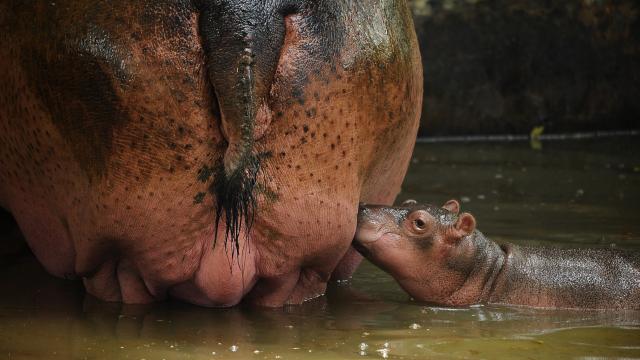We need to have a serious chat about hippo poop.
I know this will be hard, because the words “hippo poop” will never not be funny (I am literally laughing as I write them), but it’s actually an important piece of the conservation puzzle on Kenya’s Mara River.
According to new findings published in Science Advances on Wednesday, hippos act as a vital conduit for transporting silica from land to the water thanks to their prolific bowel movements. An astounding 399kg of silica gets dumped via hippo dumps into the Mara River every day, and this “biogenic silica flux” allows the base of the food chain in Lake Victoria downstream to flourish. If the hippos were to disappear, the entire food web would shift without their regular deposits.
The inspiration for the study came in part when Jonas Schoelynck, a postdoctoral researcher at the University of Antwerp, caught a presentation on hippos’ role in the Mara ecosystem and in part when he realised “that they spread tons of dung in the water while twisting their tail around.” Previous research into Mara River hippo poop (it really is a thing) showed that their prolific dumps — the average hippo can drop nearly 18kg of poop daily — can cause massive fish die offs in the Mara. But the new findings show how what taketh away the fish also giveth life to Lake Victoria’s diatoms, tiny algae that require silica to build their cell walls.
There’s a fair amount of silica available in the grasses of the savannas around the Mara. And it turns out hippos love to mow down on those grasses, eating upwards of 25kg per day. That’s a lot of roughage, which means a lot of poop.
Some of it ends up on land because hippos apparently have no qualms about shitting where they eat. The same is true for lots of other grazers as well. But since hippos spend half the day in the water, roughly half their bowel movements also end up there.
Schoelynck and a team of researcher and park rangers from Masai Mara National Reserve went into the field to sample the poo and river water and deconstruct what the hippos were dropping off in and alongside the river. The results show that hippo poop (or “egestion in water” as the scientists so politely describe it) is responsible for more than three-quarters of the silica that ends up in the river.
“This studies shows for the first time the role of large herbivores in helping the silica in plants to be transported to rivers and lake,” Schoelynck said. “Hippos act in this way as a kind of conveyor belt transporting silica from land to water.”
That silica-rich water eventually ends up in Lake Victoria where it allows diatoms to flourish. The diatoms are responsible for sucking carbon dioxide out of the air and forming the base of the food chain. The study notes without hippos, the food web would get the crap kicked out of it both literally and figuratively. Diatoms would grow less plentiful. Levels of nitrogen and phosphorus would fall out of balance compared with silica, which could make life-suffocating cyanobacteria blooms more common.
In fact, that’s been happening since the 1980s, and the research indicates declining hippo populations may be behind the trend.
“I hope indeed that with my study, the hippo is estimated as more important than just being a cool tourist attraction,” Schoelynck said.
Which yes. But also. Hippo poop.
